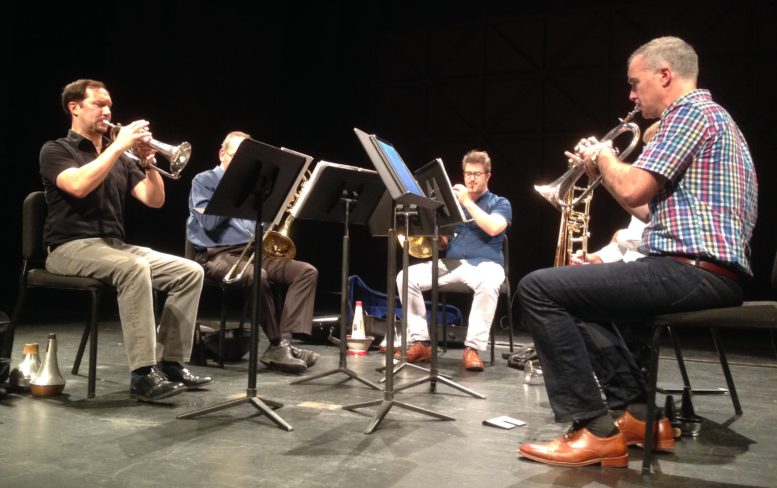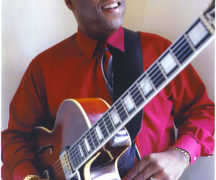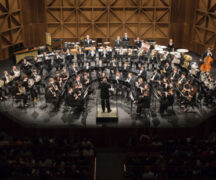By DAVID DUPONT
BG Independent News
Even at the top of their game, the members of the American Brass Quintet still understand the importance of daily practice.
John Rojak, the bass trombonist for the ensemble, said he started practicing for four hours a day back when he was an undergraduate, and he’s just now easing off on that routine.
Not that it’s easy given the musicians’ heavy workloads as teachers, freelance performers, and members of a pioneering brass ensemble.
The American Brass Quintet has been in residence at Bowling Green State University since Wednesday as guests of the Hansen Musical Arts Series. They’ve performed a mini-recital, held instrumental classes, coached, and consulted with student composers.
Their visit will culminate tonight (Friday, Sept. 22) with a free concert at 8 p.m. in Kobacker Hall in the Moore Musical Arts Center.
On Thursday afternoon they met with students to talk about the business side of music.
While the quintet represents the core of their work artistically, it is just part of how they earn their livings. They all play in a variety of settings, from chamber orchestras such as Orchestra of St. Luke’s or the Orpheus Chamber Orchestra to Broadway shows. Rojak spent years in the pit of “Les Miserables.”
Those hours in the practice room at what was then Lowell State College were the bass trombonist’s launching pad. Lowell State was his “safety school” and he was playing so he could get out. He ended up transferring to the Juilliard School of Music.
But Rojak said he got the most important music lesson playing in amateur bands. He recalled during the celebration of the nation’s Bicentennial he marched a lot. “I played more parades than anyone not in the military,” he quipped.
He played with people who were car mechanics, lawyers and other avocational musicians. “I learned that you play music because you love music.”
Then, he said, someone started paying him and he thought, “This is cool.”
Eric Reed, the quintet’s horn player and its newest member, said that getting established as a professional sometimes means taking an engagement with no pay. That can lead jobs that pay something, which in turn can lead to well-paying gigs, he said.
For that to happen, said trumpeter Kevin Cobb, a native of Bowling Green, a musician has to know how to be a good colleague. That’s someone who can handle to musical side of matters and congenial.
“Everyone wants to work with them,” he said of Rojak and trombonist Michael Powell. That’s why in a highly competitive market, especially for trombonists, they are first-call players.
The five musicians not only are colleagues in the American Brass, but have an intricate web of professional connections.
“When you’re first starting out you have to make yourself available for any opportunity,” Cobb said.
Once established, though, that attitude can get the professional in trouble.
“In my head I’m still a stereotypical freelancer,” Rojak said. “If it’s open in the book, I’ll do it.”
He once ended up teaching at six colleges within a two-hour drive, in all directions, of New York City. He took a break from his Broadway work that year, he said.
Reed said it’s also important to include some time for family and recreation.
Yet, practicing remains essential. Powell said a musician has to work continually on the fundamentals – breathing, scales, arpeggios – “the most basic stuff.”
Cobb said “I know my weaknesses intimately,” and works on addressing those every day. If he doesn’t, they will reveal themselves in embarrassing ways.
Trumpeter Louis Hanzlik said he was considering writing a book about “how to practice for people who don’t have enough time to practice.”
His point is a musician can always find the time. He teaches at the University of Connecticut, and he makes sure that he arrives early enough to get 40 minutes of work in before his first student arrives. Then he’ll practice more at lunchtime, and finally try to get another session in at the end of the workday.
“If you want to keep this going you have to carve out the time,” Hanzlik said.
These sessions should be planned with the musician knowing exactly what should be accomplished. Practicing efficiently is more important than the number of minutes.
Being ready is essential for them as professional, especially given the American Brass Quintet plays so much new music. The ensemble plays only music that’s written for brass in five voices.
Andrew Pelletier, who is horn professor at BGSU, said that “many composers, even established ones, are terrified of writing for our instruments.”
Hanzlik said the ensemble has many conversations with composers about all the possibilities and limitations.
One young composer who didn’t consult delivered a piece that was “literally unplayable,” Reed said.
It started, he said, with a very soft, high trumpet note held for about 40 seconds.
On hearing his piece, the composer agreed, and then wrote them a completely different and playable piece.
The quintet has a wish list of composers. That includes John Corigliano and John Adams. To date neither has written a piece for the quintet.
Another top composer John Zorn demurred when first asked, but then he heard the group perform and he turned around and wrote them two pieces for free.
Rojak said Chinese composer Huang Ruo wrote them a piece that seemed to start in the middle.
But the composer explained that this reflects the lack of tenses in Chinese. He also had the trombones singing one note while they are playing another. Sometimes these notes were only a half-step apart. The composer’s intention was to evoke Tibetan throat singing.
In “The Three Tenses,” he referenced other Chinese musical instruments. Without his input the musicians would not have understood the sound he wanted.
The most prominent piece the quintet has commissioned is Elliott Carter’s quintet.
The ensemble worked with the composer at the Aspen Musical Festival, where they are in residence each summer.
Carter would deliver fragments of the work to them to play. In the end, Cobb said, he gave told them what order those fragments went in, piecing together the final composition.





